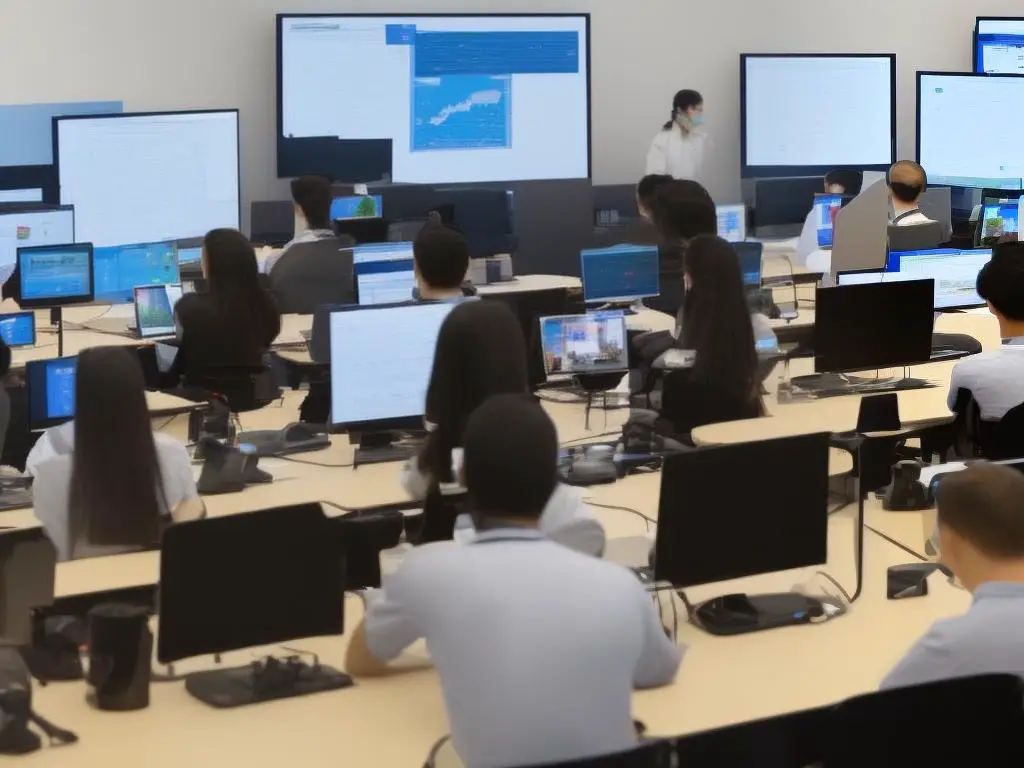Educational Agent GPT comes into play to save the learning day. The landscape of education is experiencing a massive transformation as artificial intelligence (AI) continues to make headway into various aspects of teaching and learning.
With the potential to revolutionize traditional educational practices, AI is becoming an increasingly significant topic in the realm of education. From personalized learning experiences to intelligent tutoring systems, this technology is on the brink of redefining what it means to learn and teach in the twenty-first century.
Exploring the vast range of AI applications in education, the benefits and challenges it poses, and its impact on various aspects of the field will provide valuable insights into the ongoing evolution of AI in the world of education.
AI Applications in Education – Rise of Educational Agent GPT
Table of Contents
- 1 AI Applications in Education – Rise of Educational Agent GPT
- 2 AI-Driven Analytics
- 3 AI and Learning Analytics
- 4 AI in Educational Assessment and Evaluation
- 5 Plagiarism Detection
- 6 Adaptive Testing
- 7 Concerns and Limitations
- 8 AI in Special Education
- 9 AI in Teacher Training and Professional Development
- 10 Future of AI in Education with Educational AI Agent GPT
Personalized Learning with Educational Agent GPT
One of the primary applications of artificial intelligence in education is personalized learning. AI algorithms can analyze vast amounts of student data, including performance metrics, learning styles, and preferences, to create personalized learning experiences tailored to each student’s needs.
This enables educators to focus on areas where students require the most assistance, providing targeted instruction that improves learning outcomes. Personalized learning through AI can also help reduce the time it takes for a student to grasp a concept, as the education can be tailored to their individual pace and level of understanding.
Educational Agent GPT Chatbots
Chatbots have become an increasingly popular AI application in education, serving as digital assistants for both students and educators. Chatbots can answer common questions, provide additional resources and study materials, and even assist in grading assignments.
By automating these administrative tasks, chatbots free up the valuable time of educators, allowing them to focus on more direct teaching and interacting with their students. Students benefit from the instantaneous feedback and support that chatbots provide, helping them to stay engaged and motivated in their learning.
Intelligent Tutoring Systems (ITS)
Another notable AI application in education is intelligent tutoring systems (ITS). These systems leverage artificial intelligence, cognitive science, and educational theory to provide students with tailored guidance and tutoring in a range of subject areas.
By continuously analyzing student responses and adapting their instruction accordingly, ITS can identify gaps in knowledge, misconceptions, and areas requiring more focus. This real-time feedback is essential for effective learning, as it can provide students with the necessary support to improve their understanding and skills.
Automated Assessment and Grading
AI applications in education extend to the realm of assessment and grading as well. Automated essay scoring systems and multiple-choice question analysis can significantly reduce educators’ workload by providing quick and reliable grading.
These systems use natural language processing (NLP) and machine learning techniques to evaluate student submissions and provide feedback on their work. In turn, educators can focus their energy on more direct instruction and support for their students, rather than the time-consuming task of grading.
AI-Driven Analytics
AI-driven analytics offer powerful benefits in the realm of education by providing both educators and students with valuable insights. By harnessing the power of AI in education, we are paving the way for a more personalized, efficient, and engaging learning experience for students and educators alike.
These data-driven insights help educators continuously adapt and refine their instruction, ensuring that they are meeting the needs of their students and improving learning outcomes.

Benefits and Challenges of AI in Education
Moving further into the advantages of incorporating AI in education, we see the potential for personalized learning taking center stage. AI-powered algorithms enable educational systems to analyze a student’s performance, learning preferences, and habits to tailor instruction uniquely suited to their needs.
This level of customization leads to better engagement, motivation, and ultimately improved academic outcomes for students. In addition to providing insight to educators, AI also enhances students’ learning experience through intelligent tutoring systems that offer immediate feedback and real-time lesson adjustments, ensuring they receive the support they need when they need it.
Another benefit of AI in education is the increased efficiency in various aspects of the learning process. For instance, AI-driven automation can help streamline administrative tasks like grading and lesson planning, allowing educators to focus more on direct instruction and relationship-building with students.
Furthermore, AI can analyze large amounts of data to identify trends and patterns, helping teachers and administrators pinpoint areas that require attention and adjust teaching practices accordingly. This, in turn, can lead to more effective teaching and learning strategies.
Embracing AI in education comes with its fair share of challenges. The cost associated with the development, deployment, and maintenance of AI-driven systems remains a pressing concern, as smaller schools and districts may struggle to secure the necessary resources.
This could potentially widen the gap in educational opportunities, making it imperative for policymakers and educational institutions to prioritize equitable access to AI-driven tools.
Privacy and data security pose another significant challenge in adopting AI within education. AI systems require extensive data collection and analysis to function effectively, which creates ethical concerns regarding student privacy and personal information security.
Ensuring compliance with local, national, and international data protection regulations is crucial, but it can also be a time-consuming and financially demanding process for educational institutions.
Lastly, the changing role of educators and potential job displacement due to AI integration can’t be ignored. As AI-driven tools become more sophisticated and capable of handling various teaching and administrative tasks, traditional roles may need to adapt and evolve.
Understanding the impact of AI on the education workforce is crucial for educators and policymakers to develop strategies that address potential job displacement.
AI and Learning Analytics
AI-Powered Learning Analytics in Educational Agent GPT
Learning analytics encompasses the process of collecting, measuring, analyzing, and reporting data on learners and their learning environments to understand and optimize learning experiences. Artificial intelligence (AI) technologies, particularly machine learning algorithms, have become instrumental in augmenting learning analytics by automatically processing and analyzing large datasets in real time.
Consequently, educators and institutions can gain a deeper understanding of student performance and learning effectiveness, leading to more personalized and adaptive learning experiences for students, which can help address some of the challenges associated with implementing AI in education.
The Role of AI in Learning Analytics
Machine learning algorithms can be used to identify patterns and relationships in educational data, providing educators with insights to inform decision-making and tailor instruction. This may involve the analysis of assessment results, student engagement metrics, or learning behaviors to help educators understand individual learning needs and preferences.
These analytics can also support curriculum design by revealing areas in which students are struggling and identifying content and instructional strategies that are proving most effective. Additionally, AI-powered learning analytics can identify students who may be at risk of falling behind or dropping out, allowing for early intervention strategies to be implemented in a proactive manner.
Benefits of AI in Learning Analytics
AI-driven learning analytics can benefit institutions and education systems as a whole. For example, AI can help institutions identify trends and pain points within their curricula, leading to more effective policies and practices. It can also facilitate research and development efforts in education by providing data-driven insights into pedagogical approaches and learning tools.
Ethical Concerns and Considerations
However, the use of AI in learning analytics also raises ethical concerns, particularly around data privacy and consent. As large datasets on student learning are collected, stored, and analyzed, the risk of misuse or inadvertent disclosure of sensitive information increases.
Additionally, there may be concerns regarding the impact of algorithmic decision-making on educational equity, as biases in algorithms can lead to disproportionate effects on certain student groups. The establishment and enforcement of clear data privacy policies and transparency around the development and use of AI technologies are essential in addressing these concerns and fostering trust among stakeholders.
Challenges of AI in Learning Analytics
One potential challenge associated with AI in learning analytics is the requirement for human interpretation of the data and insights generated. While AI can offer valuable information about student performance and learning progress, it still remains the duty of educators and administrators to interpret this information within a broader context and make informed decisions for their students and institutions.
By ensuring that AI tools complement, rather than replace, existing expertise, stakeholders can harness the potential of learning analytics without sacrificing the complex and nuanced understanding of learning that human educators can provide.

AI in Educational Assessment and Evaluation
Transitioning from Learning Analytics to AI Applications in Assessment
As AI technologies continue to enhance learning analytics, applications also extend into areas such as educational assessment and evaluation. One notable example is automated essay grading, which leverages machine learning algorithms to predict essay scores based on features like lexical complexity, sentence structure, and coherence.
This helps to reduce the time and effort involved in human grading, allowing teachers to focus on more qualitative aspects of teaching.
Nevertheless, the effectiveness of automated essay grading remains a subject of debate among experts. Critics argue that AI-driven systems might fall short in assessing the nuanced aspects of human writing, such as creativity, humor, irony, and cultural relevance.
Plagiarism Detection
Another prominent use of AI in educational assessment is plagiarism detection. Advanced tools powered by natural language processing algorithms can detect instances of copying or paraphrasing from various online sources.
These tools can also detect instances of self-plagiarism, where students submit their past work as new assignments. Furthermore, AI-powered plagiarism detection tools can help deter academic dishonesty by alerting students to potential plagiarism in their work before submission.
Adaptive Testing
Adaptive testing represents another key application of AI in educational evaluation. Adaptive tests are designed to adjust the difficulty level of questions in real-time based on a student’s previous responses.
AI-driven algorithms can analyze a student’s responses to determine their proficiency level and serve them with an appropriate set of questions. This type of testing not only offers a personalized learning experience but also facilitates a more accurate measurement of a student’s abilities.
Concerns and Limitations
While AI-driven educational assessment and evaluation technologies have clear potential benefits, it is crucial to consider the drawbacks and limitations. One significant concern is that these systems may exacerbate the existing digital divide.
Students in underserved communities, who may have limited access to computers and high-speed internet, could be at a disadvantage. Also, privacy and security concerns arise as these AI systems need to process and analyze large amounts of student data, making it imperative to protect sensitive information and prevent misuse.
In conclusion, AI in educational assessment and evaluation has the potential to revolutionize the way students’ learning and performance are measured.
Tools such as automated essay grading, plagiarism detection, and adaptive testing offer new and efficient ways to enhance the student experience. Additionally, AI can transform the field of special education by offering personalized learning experiences for students with varying abilities and learning preferences.

AI in Special Education
Artificial Intelligence and Special Education
One particular area where AI can make a significant impact is special education. AI-powered tools can analyze students’ learning profiles, allowing for the creation of customized educational content tailored to the unique needs of each student.
This is especially beneficial for students with learning disabilities or other special needs, as they often require more individualized attention and support to overcome challenges and achieve their full potential. However, as with any emerging technology, it is essential to address potential concerns, including the digital divide, privacy, and security issues, to ensure a fair and equitable learning environment for all students.
Personalized Learning
One of the primary advantages of using AI in special education is the capacity for personalized learning. AI algorithms can assess individual learning styles and needs, as well as track progress and performance in real-time.
This allows for the development of personalized learning plans that cater to students’ unique strengths and weaknesses. For example, AI-powered tools can adapt the curriculum, teaching strategies, and even the pace of learning for each student, ensuring that they receive the support they need in a way that works best for them.
Increased Accessibility
Another benefit of AI in the field of special education is the increased accessibility of learning opportunities. With the help of AI-powered technologies such as speech-to-text software, virtual assistants, and learning apps, students with learning disabilities or other special needs can access educational content in a variety of formats, such as audio, visual, or text-based materials.
This not only helps to improve comprehension and retention of information but also fosters a more inclusive learning environment in which all students can thrive.
Challenges and Concerns
Implementing AI technologies in special education settings presents numerous challenges. One significant problem is the lack of standardization and regulation in the AI industry, making it difficult for educators to navigate the vast array of available tools and platforms.
Additionally, many educators may not have the necessary training or experience to use AI-powered technologies, and schools might not possess the resources to provide such training. This lack of access can lead to a digital divide, where students attending schools with more technology and resources gain an advantage in their learning experiences.
Another challenge pertains to ethical and data privacy concerns surrounding AI in special education. Issues may arise from the collection, storage, and usage of students’ personal information and learning data, including the potential for misuse and questions about privacy rights protection.
Furthermore, the debate continues about the impact of AI on human interaction and the role of teachers in special education settings. While AI can undoubtedly provide valuable support in the learning process, it is crucial to balance technology-driven learning with the essential human element of empathy, compassion, and interpersonal connections.

AI in Teacher Training and Professional Development
AI in Education: Revolutionizing Teacher Training
Addressing the challenges previously mentioned, one promising aspect of AI involves its potential to significantly advance teacher training and professional development in special education. By utilizing AI tools, educators can gain a better understanding of their teaching methodologies and tailor them to accommodate the diverse needs of their students.
Through the analysis of extensive student performance data, AI can provide insights into the effectiveness of various teaching methods, highlighting areas that require improvement. This enables educators to become more reflective practitioners, allowing them to continuously refine their teaching methods and ultimately enhance student outcomes.
However, ensuring that schools and educators have the necessary resources and training to leverage AI technologies will be crucial in bridging the digital divide and minimizing potential ethical concerns.
Facilitating Better Collaboration Between Teachers with Educational Agent GPT
AI-powered platforms can also facilitate better collaboration between teachers. These platforms can enable educators to share teaching strategies, techniques, and resources to foster continuous improvement. Such platforms can utilize natural language processing and sentiment analysis to curate and recommend content and resources tailored to individual educators’ needs.
This not only saves time but also enhances the educators’ capacity to address critical teaching and learning challenges effectively.
Providing Personalized Professional Development Opportunities
Moreover, AI can play a vital role in providing personalized professional development opportunities for educators. AI-driven training modules can offer targeted workshops, courses, and seminars based on each teacher’s identified areas of improvement.
This personalized attention can in turn accelerate educators’ growth and performance, ensuring they are well-supported in their careers. By engaging in these tailored training experiences, educators are better prepared to support their students while also continuing their own professional growth.
Understanding Student Needs
Understanding student needs is another area where AI can significantly contribute to teacher training. Machine learning algorithms can analyze student data, such as grades, attendance, and behavior, to identify patterns and trends that might not be apparent to educators.
These insights can help teachers adjust their instructional methods and develop more targeted interventions for students, resulting in better learning outcomes. By utilizing AI in this way, educators can gain a deeper understanding of their students and create more inclusive learning environments.
Effective Integration of AI Tools in Classrooms
As industry experts looking to become proficient in AI’s applications in education, one must emphasize the importance of training teachers to use AI tools effectively. The impact of these technologies largely depends on educators’ ability to integrate them seamlessly into their classrooms.
By providing ongoing professional development opportunities focused on AI, teachers will be well-equipped to harness the power of these tools for more efficient and effective instruction. As AI continues to advance, it is crucial that educators remain engaged in relevant training to maximize the technology’s potential in teaching practices.

Future of AI in Education with Educational AI Agent GPT
With the increasing interest and advancements in AI, the future of AI in education is promising. A possible direction in this field is the continued development and expansion of intelligent tutoring systems. These are already being used across various educational settings and use AI algorithms to cater to individual learners’ needs while providing personalized feedback.
As AI technology improves, it is likely that intelligent tutoring systems will become more sophisticated, accurately analyzing student data and providing targeted and effective feedback.
Furthermore, the increased integration of AI into several aspects of the educational experience, including personalized learning plans and administrative tasks, will revolutionize the sector. For instance, AI-driven software could efficiently plan and manage curricula, allowing educators to focus more on teaching.
AI could also streamline and improve the assessment process, using machine learning algorithms to evaluate and grade student work more fairly, consistently, and quickly than human evaluators can.
As we venture further into the realm of AI in education, ethical considerations and policy changes will be necessary to ensure responsible use and implementation.
These may include guidelines on data privacy, decision-making processes involving AI, and potential biases unintentionally embedded within AI systems. Collaboration between AI researchers, educational experts, policymakers, and other stakeholders will be crucial in developing comprehensive strategies for addressing these concerns and responsibly deploying AI in educational settings.
One promising research direction involves creating AI systems that learn from and collaborate with human educators. Rather than replacing teachers, AI could act as a supportive partner, amplifying their abilities and enabling more effective educational experiences.
This approach, called ‘human-centered AI,’ may involve developing new AI models and algorithms that enhance human-AI collaboration and communication in educational environments.
Lastly, the future of AI in education will increasingly focus on acquiring soft skills such as critical thinking, problem-solving, and teamwork, driven by the growing demand for these competencies in the job market. AI tools facilitating the development of these skills will offer adaptive, individualized learning experiences that encourage higher-level thinking and creative problem-solving.
Ultimately, the intersection of AI and education has the potential to redefine teaching and learning, opening new doors to personalized and effective educational experiences for learners of all backgrounds and abilities.

As we usher in a new era of advanced technology in the field of education, it becomes imperative to embrace the potential of AI in transforming teaching and learning experiences.
By understanding the diverse applications, benefits, challenges, and future developments of AI in education, stakeholders can harness its power to create more efficient and effective learning environments.
As we move forward in the digital age, artificial intelligence will continue to play an increasingly pivotal role in shaping the future of education, making it essential for educators, policymakers, and researchers to remain informed and agile in our ever-evolving world.

I’m Dave, a passionate advocate and follower of all things AI. I am captivated by the marvels of artificial intelligence and how it continues to revolutionize our world every single day.
My fascination extends across the entire AI spectrum, but I have a special place in my heart for AgentGPT and AutoGPT. I am consistently amazed by the power and versatility of these tools, and I believe they hold the key to transforming how we interact with information and each other.
As I continue my journey in the vast world of AI, I look forward to exploring the ever-evolving capabilities of these technologies and sharing my insights and learnings with all of you. So let’s dive deep into the realm of AI together, and discover the limitless possibilities it offers!
Interests: Artificial Intelligence, AgentGPT, AutoGPT, Machine Learning, Natural Language Processing, Deep Learning, Conversational AI.

